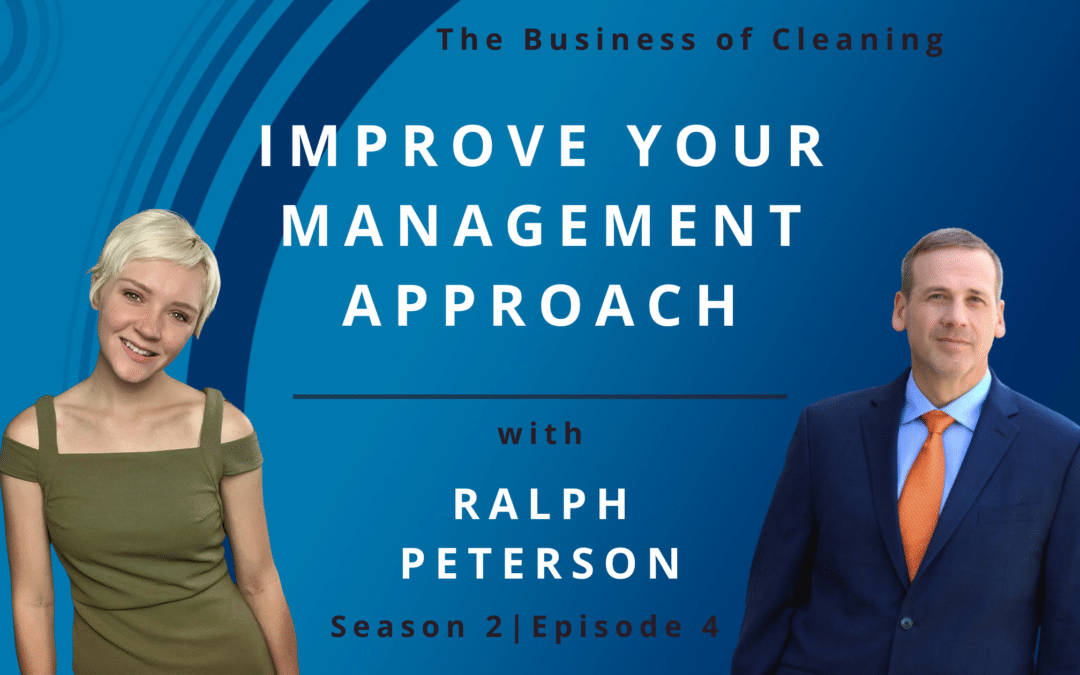Leading and managing successfully can be difficult to nail down, especially when in-person seminars are few and far between right now. We sat down with someone who’s expertise in management in the cleaning industry to help you refine your own management just a little bit more.
Click Here To Subscribe On Your Favorite Platform!
Podcast Transcription
About This Guest:

Ralph Peterson
Owner - Ralph Peterson Management Services
Ralph Peterson is a housekeeping management trainer, specializing in the healthcare and long-term care spaces. He has hired, promoted, and trained managers, those first-timers to the most experienced, for over 20 years.
We sat with Ralph to discuss the industry, especially recently, and process management on the job. Ralph first joined the industry at 16 by cleaning ski condominiums and didn’t expect to return to it after college, but when he was offered a great management position, later on, he returned for the long haul.
A Realistic Scale
During his episode with The Business of Cleaning, Ralph talked about how to set realistic expectations for our cleaners without giving workers a free pass to do less or punishing them when they can’t be perfect.
On a scale dictating how well you did, you either did the job or you didn’t. For example, at one of the facilities, Ralph’s team was given a 3 on everything on a scale of 1 to 5. So Ralph did a walk through and asked what they could do to do better.
The answer he received? Nothing.
They loved the job and were completely satisfied but the woman he spoke with didn’t believe in perfection. She saw 5 as perfect and thus unattainable. This lead to confusion and a lack of clear communication.
Ralph understands that if he assigns 25 rooms, it is not always possible for an employee to get all 25 done. Sometimes the rooms are occupied or have something going on that does not allow a cleaner to come in and they don’t make it back. He also realizes that people wear down over time and that they’re not as thorough on room 25 as they were in room 1 and that’s perfectly natural.
Instead, Ralph alternates what rooms are started on and he has a checklist for when rooms are completed. If a room is missed then it is the first room done the next morning. This is a realistic expectation for employees and by establishing a line of trust then employees are willing to honestly report when they miss a room.
The Leadership System
Decide. Communicate. Follow-Up.
Break down your leadership system into 3 steps and create a cyclic pattern of it. Start with your decision. What are you going to do? Whatever your answer is, ensure you are decisive and carry through. If you say you’re going to have these rooms cleaned. It is your job to get those rooms cleaned.
Next, communicate. Communicate with the employees who are cleaning and with those who might interact with some area of the job. If a change is made, communicate it. Make sure you are also communicating in a way the employee understands and a way that reaches them.
Communication is hard because what might be easiest or most convenient for you might not be the most effective means of communication. Where do your employees find information? How do they communicate back to you if they have any questions? Ensure you are using the channels they’re using and that they have a way to easily talk to you.
Lastly, assess the results. Look at what you’ve done and how effective you’ve done it. Was this a good change or a bad change overall? Why? What were the positive results and the negative? Will you maintain this change? What adjustments will you make? Why?
Now you make your decision and do it all over again. It becomes habitual. A good manager will adapt this cycle into their regular habits and use it to do what they’re there to do and that ensures that the job gets done.
Building Trust
One of the hardest things to do with employees is build trust. Employees come in with invisible scars from old employers and stereotypes of what “boss” means. It’s a hard perception to break.
Instead, focus on building trust through transparency and being forgiving. Your employees are people. Respect their natural curiosity and don’t give them instructions without answering why. They can’t get behind the reasoning if they don’t know.
Introducing new chemicals because CDC guidelines shifted? Don’t just swap out the product without saying anything. They may not complain upfront, but humans are creatures of habit and changes like that can still bother your employees, especially if the chemical smells differently, has a longer dwell time, or has to be applied with different equipment.
Don’t place blame on the CDC because now you’re just redirecting negative emotions. Instead, understand and communicate why that change must be made.
The realistic scale of expectations also helps with trust and so does consistency. Ensure that you set up a fair way of measuring performance and success and that every employee is held to it equally every time they do a job.
Check their work. Checking work isn’t always a way to say that you don’t trust your employees to do the job. It also shows that you’re paying attention to their work and that it’s important to you. It also helps ensure that you are able to consistently hold employees to the same standard. They may not like it but over time it builds trust.
Lastly, acknowledge the good too. It’s easy to make comments about what wasn’t done properly but if that’s all you’re saying or if it’s most of it then that it is the feeling they are going to start associating those negative emotions to their work very quickly and it will greatly impact their morale. Acknowledge their successes helps them feel appreciated and understand what they can do to do a successful job.
In Conclusion
If you can set clear and fair expectations, follow the leadership system, and build trust with your employees, you can build good management within your cleaning business. It takes time and there is a learning curve to every change, but these things can help your business become more successful and grow.

